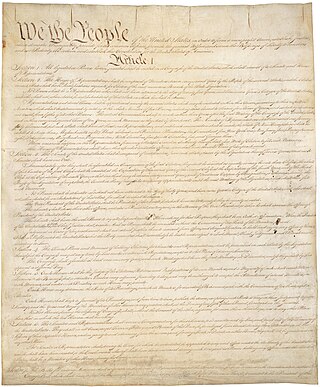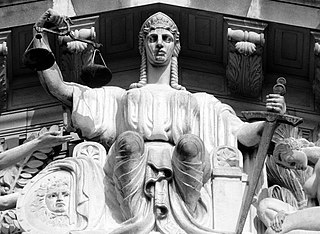
The British Islands is a term within the law of the United Kingdom which refers collectively to the following four polities:

In English law, natural justice is technical terminology for the rule against bias and the right to a fair hearing. While the term natural justice is often retained as a general concept, it has largely been replaced and extended by the general "duty to act fairly".
False imprisonment or unlawful imprisonment occurs when a person intentionally restricts another person’s movement within any area without legal authority, justification, or the restrained person's permission. Actual physical restraint is not necessary for false imprisonment to occur. A false imprisonment claim may be made based upon private acts, or upon wrongful governmental detention. For detention by the police, proof of false imprisonment provides a basis to obtain a writ of habeas corpus.

The doctrine of legitimate expectation was first developed in English law as a ground of judicial review in administrative law to protect a procedural or substantive interest when a public authority rescinds from a representation made to a person. It is based on the principles of natural justice and fairness, and seeks to prevent authorities from abusing power.
In Australian constitutional law, Chapter III Courts are courts of law which are a part of the Australian federal judiciary and thus are able to discharge Commonwealth judicial power. They are so named because the prescribed features of these courts are contained in Chapter III of the Australian Constitution.

Robert Lionel Archibald Goff, Baron Goff of Chieveley, was an English barrister and judge who was Senior Lord of Appeal in Ordinary, the equivalent of today's President of the Supreme Court. Best known for establishing unjust enrichment as a branch of English law, he has been described by Andrew Burrows as "the greatest judge of modern times". Goff was the original co-author of Goff & Jones, the leading English law textbook on restitution and unjust enrichment, first published in 1966. He practised as a commercial barrister from 1951 to 1975, following which he began his career as a judge. He was appointed to the Judicial Committee of the House of Lords in 1986.
Judicial review is a part of UK constitutional law that enables people to challenge the exercise of power, usually by a public body. A person who contends that an exercise of power is unlawful may apply to the Administrative Court for a decision. If the court finds the decision unlawful it may have it set aside (quashed) and possibly award damages. A court may impose an injunction upon the public body.
The Supreme Court of the Cocos (Keeling) Islands is the de jure superior court for the Cocos (Keeling) Islands, an Australian external territory. The court was originally established in 1958 after the British Government transferred sovereignty for the islands from Singapore to Australia. The court had jurisdiction to deal with all serious crimes and major civil claims for damages occurring on the Island.
Wednesbury unreasonableness is a ground of judicial review in Singapore administrative law. A governmental decision that is Wednesbury-unreasonable may be quashed by the High Court. This type of unreasonableness of public body decisions was laid down in the English case of Associated Provincial Picture Houses v. Wednesbury Corporation (1947), where it was said that a public authority acts unreasonably when a decision it makes is "so absurd that no sensible person could ever dream that it lay within the powers of the authority".

The law of the United States comprises many levels of codified and uncodified forms of law, of which the most important is the nation's Constitution, which prescribes the foundation of the federal government of the United States, as well as various civil liberties. The Constitution sets out the boundaries of federal law, which consists of Acts of Congress, treaties ratified by the Senate, regulations promulgated by the executive branch, and case law originating from the federal judiciary. The United States Code is the official compilation and codification of general and permanent federal statutory law.

The remedies available in Singapore administrative law are the prerogative orders – the mandatory order, prohibiting order (prohibition), quashing order (certiorari), and order for review of detention – and the declaration, a form of equitable remedy. In Singapore, administrative law is the branch of law that enables a person to challenge an exercise of power by the executive branch of the Government. The challenge is carried out by applying to the High Court for judicial review. The Court's power to review a law or an official act of a government official is part of its supervisory jurisdiction, and at its fullest may involve quashing an action or decision and ordering that it be redone or remade.

Administrative law in Singapore is a branch of public law that is concerned with the control of governmental powers as exercised through its various administrative agencies. Administrative law requires administrators – ministers, civil servants and public authorities – to act fairly, reasonably and in accordance with the law. Singapore administrative law is largely based on English administrative law, which the nation inherited at independence in 1965.

Illegality is one of the three broad headings of judicial review of administrative action in Singapore, the others being irrationality and procedural impropriety. To avoid acting illegally, an administrative body or public authority must correctly understand the law regulating its power to act and to make decisions, and give effect to it.

Threshold issues are legal requirements in Singapore administrative law that must be satisfied by applicants before their claims for judicial review of acts or decisions of public authorities can be dealt with by the High Court. These include showing that they have standing to bring cases, and that the matters are amenable to judicial review and justiciable by the Court.

The remedies available in a Singapore constitutional claim are the prerogative orders – quashing, prohibiting and mandatory orders, and the order for review of detention – and the declaration. As the Constitution of the Republic of Singapore is the supreme law of Singapore, the High Court can hold any law enacted by Parliament, subsidiary legislation issued by a minister, or rules derived from the common law, as well as acts and decisions of public authorities, that are inconsistent with the Constitution to be void. Mandatory orders have the effect of directing authorities to take certain actions, prohibiting orders forbid them from acting, and quashing orders invalidate their acts or decisions. An order for review of detention is sought to direct a party responsible for detaining a person to produce the detainee before the High Court so that the legality of the detention can be established.

Exclusion of judicial review has been attempted by the Parliament of Singapore to protect the exercise of executive power. Typically, this has been done though the insertion of finality or total ouster clauses into Acts of Parliament, or by wording powers conferred by Acts on decision-makers subjectively. Finality clauses are generally viewed restrictively by courts in the United Kingdom. The courts there have taken the view that such clauses are, subject to some exceptions, not effective in denying or restricting the extent to which the courts are able to exercise judicial review. In contrast, Singapore cases suggest that ouster clauses cannot prevent the High Court from exercising supervisory jurisdiction over the exercise of executive power where authorities have committed jurisdictional errors of law, but are effective against non-jurisdictional errors of law.
The failure of a public authority to take into account relevant considerations and the taking of irrelevant ones into account are grounds of judicial review in Singapore administrative law. They are regarded as forms of illegality.
Plascon-Evans Paints Ltd v Van Riebeeck Paints (Pty) Ltd is an important case in South African law, particularly in the area of civil procedure and trade marks.

An ouster clause or privative clause is, in countries with common law legal systems, a clause or provision included in a piece of legislation by a legislative body to exclude judicial review of acts and decisions of the executive by stripping the courts of their supervisory judicial function. According to the doctrine of the separation of powers, one of the important functions of the judiciary is to keep the executive in check by ensuring that its acts comply with the law, including, where applicable, the constitution. Ouster clauses prevent courts from carrying out this function, but may be justified on the ground that they preserve the powers of the executive and promote the finality of its acts and decisions.

Collins v Wilcock is an appellate case decided in 1984 by a divisional court of the Queen's Bench Division of the High Court of England and Wales. It is concerned with trespass to the person focusing on battery.












